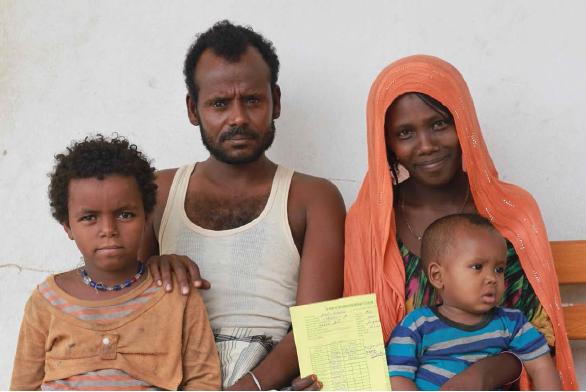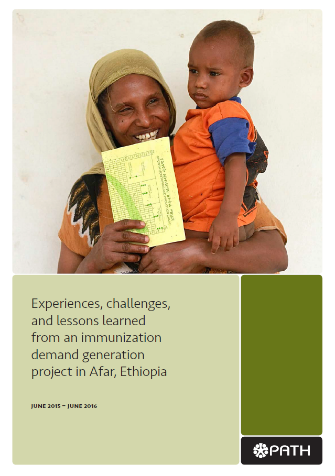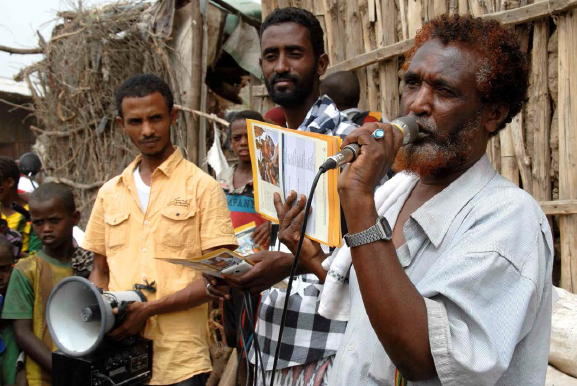Immunization demand generation in Afar, Ethiopia
By Jemberu Raya Soressa, Immunization Advocacy & Communications Officer, PATH Ethiopia
Nov 7, 2016
Posted in News, Policies & Practices

Photo: PATH/Therese Bjorn Mason. Medina Abdul with her husband, Mohamed Musa, her son, Hanfare, and a niece, Yalo District.
PATH recently released a report on our demand generation efforts to increase immunization uptake in Afar, Ethiopia.
 Vaccine uptake in the remote region of Afar was hampered by poor infrastructure, difficulty reaching nomadic populations, and keeping vaccines cold in one of the hottest places on earth. While the whole of Ethiopia reports 19 percent of children under 5 not immunized, immunization coverage in the Afar region falls to 9 percent among children 12-23 months old.
Vaccine uptake in the remote region of Afar was hampered by poor infrastructure, difficulty reaching nomadic populations, and keeping vaccines cold in one of the hottest places on earth. While the whole of Ethiopia reports 19 percent of children under 5 not immunized, immunization coverage in the Afar region falls to 9 percent among children 12-23 months old.
When investigating why women and children were not being immunized, it became clear that many Afar communities not only lacked awareness of the health benefits of vaccines but also actively feared immunization. For example, parents feared vaccines would paralyze their children or were expired medicines from abroad.
To address these issues, Ethiopia launched the Health Extension Program deploying Health Extension Workers (HEWs) to reach rural populations as well as Social Mobilization Committees (SMCs) to reach pastoralist regions, such as Afar. Using the data on low immunization coverage and the reasons why, PATH, with support from Gavi, the Vaccine Alliance; provided advocacy and communication support to the Afar Regional Health Bureau to strengthen outreach to religious leaders followed by support to the SMCs at the district and kebele (village) level to plan, execute, and monitor immunization promotion activities. The project focused on five forums: schools, mosques, religious ceremonies, Women’s Federation meetings, and market places in the Berhale and Yalo Districts.

Photo: PATH/Therese Bjorn Mason. Kedir with Mustufa Ahmed (Health Extension Worker) and SMC member, Diminuw Ali at the market in Yalo town.
At the weekly market place, an SMC member accompanies the EPI Coordinator in Yalo District to deliver pro-immunization messages since a large crowd is expected. Through disseminating flyers, using the megaphone, enlisting the support of local leaders, and holding competitions for phone cards, they are able to engage the audience to successfully shift misconceptions about vaccines and increase vaccination coverage.
“I’ve only been an EPI coordinator for two years, but I know from colleagues and from district data that there was a low uptake of vaccines in the community. Now I can witness that people’s perceptions are changing. Now we are achieving good results and the number of children brought to us to be vaccinated is going up.” – Kedir Biru Mulat, Yalo District.
The project demonstrated that creating a demand for immunization and ultimately behavior change can be achieved very cost-effectively. HEWs were inspired by the work of the SMCs and seized opportunities to promote immunization. For example, when distributing seeds to farmers during a drought, HEWs promoted immunization at that time as well.
“The Social Mobilization Committee is the key to success. Before we never gathered the population in public to speak to them about immunization but now we look for opportunities when people gather not only just in the market places, schools, mosques, but also when people gather at OTP (Outpatient Therapeutic Program) sites, and come receive their food aid.” – Melaku Bayew, EPI Focal person, Gube Dora Health Centre, Yalo District.
Behavior change is critical to adopting new practices. The BID Initiative has also experienced community hesitation when barcodes were introduced on child health cards in Tanzania. The team was able to alleviate concerns by creating specific messages targeted at concerned mothers and partnering closely with health workers to hold health education sessions that explained the introduction and purpose of the barcode stickers. As a result, the BID Initiative gained community acceptance by reinforcing the benefits of barcodes and how they could help improve immunization coverage.
The Ministry of Health in Ethiopia has expressed interest in adapting and applying the BID Initiative to enhance immunization and overall health service delivery through better data collection, quality, and use. Our team is working closely with the MOH to facilitate a learning visit to view BID solutions in practice in Tanzania. Stay tuned for more to come!
You can read the full report for more details on our approach in each forum, the successes, challenges and lessons learned.
